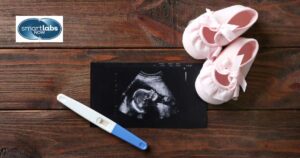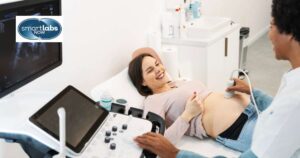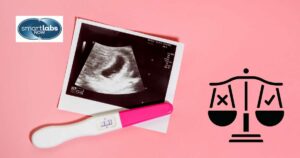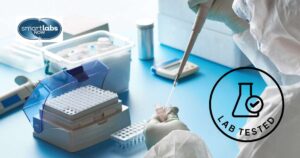
Pregnancy is an exciting yet complex journey that often brings about important questions, including those about paternity.
Whether you’re seeking answers for personal reasons or need legal confirmation, advancements in DNA science now make it possible to determine paternity safely during pregnancy, offering testing solutions designed to give you definitive results.
If you’re wondering, “Where can I get a DNA test while pregnant?”, rest assured that numerous reputable labs now provide safe and accurate prenatal paternity testing options tailored to your specific needs.
At Smart Labs Now, we specialize in accurate, affordable, and discreet DNA testing for Portland residents.
BOOK NOW to prioritize your health with our gentle and professional testing services.

Non-invasive prenatal paternity (NIPP) testing is a groundbreaking method that allows for determining paternity as early as 7 weeks into pregnancy.
Unlike older methods such as amniocentesis or chorionic villus sampling, NIPP is entirely safe for both the mother and the fetus because it involves a simple blood draw from the mother.
A 2023 study by Zhang, Y., et al. investigates the use of targeted fetal DNA analysis for early noninvasive prenatal paternity testing, demonstrating its feasibility and accuracy.
By analyzing fetal DNA present in the mother’s bloodstream, labs can isolate and compare genetic locations to determine paternity with remarkable accuracy.
Laboratories performing NIPP should hold AABB (Association for the Advancement of Blood & Biotherapies) accreditation, ensuring the highest standards of testing.
NIPP can serve both personal and legal purposes. However, only tests conducted under a proper chain-of-custody process are admissible in court.
For parents seeking clarity early in pregnancy, NIPP offers peace of mind without the stress of invasive procedures.
It’s important to note that NIPP is less effective in twin pregnancies because isolating fetal DNA from two fetuses is significantly more complex.
Organizations such as the American Pregnancy Association recommend NIPP for its safety and reliability.
If you’re considering this option, ensure the lab you choose uses state-of-the-art techniques and holds the necessary accreditations.

The process of prenatal paternity testing is straightforward and designed to minimize stress for expectant mothers.
This 2020 research published in ‘Journal of Clinical Laboratory Analysis’ develops a method for noninvasive prenatal paternity testing using targeted sequencing of single nucleotide polymorphisms (SNPs), highlighting its effectiveness and cost-efficiency.
Advanced DNA diagnostics centers use sophisticated techniques to analyze genetic markers and compare them across samples.
Specific genetic locations are examined to confirm biological relationships.
If a court-admissible paternity test is required, the lab follows strict chain-of-custody protocols to maintain the integrity of the samples.
Results are typically available within 5-7 business days, depending on the lab’s turnaround time.
With its non-invasive nature and scientific accuracy, prenatal paternity testing ensures expectant parents can make informed decisions during this critical time.

The reliability and safety of non-invasive prenatal paternity tests are underpinned by cutting-edge advancements in DNA science.
The 2011 article by Wang, E., et al. discusses the scientific principles and safety aspects of non-invasive prenatal testing utilizing fetal DNA present in maternal blood.
Here’s what you should know:
By leveraging advancements in DNA science, non-invasive prenatal paternity tests offer a safe, efficient, and accurate solution for determining paternity during pregnancy.

Prenatal paternity testing involves more than just the science of DNA, it includes various legal and practical aspects that parents need to consider, particularly if the test results will be used in legal proceedings.
A 2020 committee opinion published by the ‘American College of Obstetricians and Gynecologists’ discusses legal considerations in genetic screening and testing, including the importance of informed consent and the potential legal implications of genetic test results. It emphasizes the need for healthcare providers to understand the legal aspects of genetic testing to guide patients appropriately.
For a prenatal paternity test to be legally admissible in court, it must be performed at an AABB-accredited laboratory.
This ensures the testing process meets high standards of accuracy.
Legal paternity tests must adhere to strict protocols, including chain-of-custody procedures, to ensure the results are recognized by the court.
While home paternity tests are available, they cannot be used for legal purposes.
These tests are typically meant for personal use only and lack the rigorous documentation required for court use.
In cases involving immigration, prenatal paternity tests can be used if the lab meets all legal requirements. These tests help establish familial relationships for visa and residency purposes.
It’s important to know the difference between legal and non-legal prenatal paternity tests.
Non-legal tests are typically used for informational purposes, while legal tests follow the protocols necessary for official use, such as in child support cases or custody disputes.
By understanding these legal and practical considerations, parents can make informed choices regarding prenatal paternity testing.

Prenatal paternity testing comes with financial and logistical considerations that vary based on the test type and provider.
Reputable labs ensure quality and accuracy.
Pricing depends on factors like the number of tested parties and whether the test is intended for personal or legal use.
Payment plans, such as those offered through Affirm financing partnerships, can make the process more affordable.
While at-home paternity tests are available, they are not recommended due to accuracy concerns. Professional expertise ensures precise results.
Non-invasive tests require a maternal blood draw and a cheek swab from the potential father, making the process simple yet effective.
Some labs also offer optional testing for the baby’s gender, providing further insights for expectant parents.
Results are typically available within a week, though expedited options may be offered for an additional fee.
Accessing a high-quality lab with transparent pricing and flexible payment options ensures a smooth experience.
Always inquire about specific costs and services before proceeding.

Selecting a high-quality testing lab is a critical step in ensuring accurate and reliable results.
Choose labs accredited by organizations such as the AABB to ensure compliance with stringent quality standards.
Labs with comprehensive oversight programs maintain higher standards of accuracy and consistency in testing.
Trusted facilities are known for their expertise in non-invasive prenatal paternity tests.
Opt for labs that utilize the latest advancements in DNA technology to guarantee precise results.
Confirm that the lab offers a high accuracy rate, often exceeding 99.9%, ensuring dependable outcomes.
A supportive and knowledgeable customer care team can guide you through the emotional process of paternity testing, addressing concerns and providing clarity.
Ensure the lab provides clear information on testing costs and any additional fees, avoiding hidden charges.
Look for labs offering a variety of DNA testing options beyond paternity, such as relationship DNA tests and immigration DNA testing.
Choosing the right lab can significantly impact your testing experience, offering peace of mind and reliable results during a potentially emotional journey.

Ans: No, prior pregnancies do not impact the accuracy of NIPP as it isolates the current fetus’ DNA.
Ans: Many reputable labs, including those with strong customer care teams, offer access to counseling or emotional support resources. Testing can be a sensitive process, and professional guidance can help ease concerns.
Ans: Yes, but only if conducted through a lab that follows a chain-of-custody process for legal testing.
Ans: Costs vary depending on the type of test and number of parties involved. Contact our customer care team for a detailed quote.
Ans: Yes, immigration cases can use prenatal DNA tests provided the lab meets legal requirements.
Ans: NIPP tests are highly accurate, with results exceeding 99.9% certainty when performed by accredited labs.

Connect with us today for in-lab or on-site testing. Gain court-admissible certainty of biological parentage with cutting-edge non-invasive testing options.
BOOK NOW to prioritize your health with our gentle and professional testing services.
DISCLAIMER:
Please consult your primary care physician before engaging with any pharmaceutical, natural substances, or activity regimens mentioned or prescribed in this post. Smart Labs Now is not responsible for health or life outcomes based on the information or recommendations provided. This account does not serve as a substitute for professional medical advice/help.